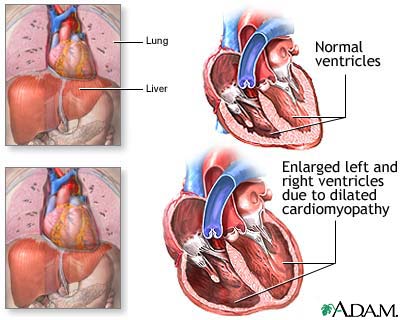 |
| Ischemic Cardiomyopathy |
If the patient is found with these symptoms then immediate check up is required. The patient should be frequently under medical supervision of the doctor. Tests must be done in every months to know about the status. Improper diet is also one of the main causes of ischemic cardiomyopathy. The patients of Ischemic cardiomyopathy are suggested to lay more emphasis on diet and exercise. Usually doctor perform many tests on the patients of ischemic cardiomyopathy. This disease is one of the types of cardiomyopathy. Cardiomyopathy is one of the types of heart disease in which the heart becomes enlarged and eventually results in the improper ability of muscles to pump the blood. Abnormalities in ischemic cardiomyopathy is common to see. The disease can be diagnosed physical exam and the patients medical history test. The tests done by the doctor include CT scan, radionuclide studies, cardiac catheterization, chest X-ray, MRI scan, blood tests, exercise stress test, electrocardiogram (ECG) and echocardiogram. ALL these tests are necessary to detect the risk and complications. These tests will help the doctor to see the depth of the disease. There are many medications available which will improve the heart conditions. But it is suggested to take the medications after the tests are done.
Medications for the patients of ischemic cardiomyopathy are given for two reasons to treat the symptoms and to improve the cardiac function. Whatever may be the medications and tests but if the patient improve his or her diet it can help to remove many symptoms and complications. Regular exercise and maintaining healthy diet is necessary to improve the heart condition. Some patients also undergo many therapies to improve the cardiac conditions. If the disease is extreme then emergency necessary must be done. The rate of heart patients is increasing with each year especially in developed countries. One of the main reasons for the increasing heart risk is the change in the lifestyle.





